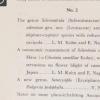
14-02-2026 22:45
Hy!I would ask for some help determing this specie

09-02-2026 14:46
Anna KlosGoedemiddag, Op donderdag 5 februari vonden we ti

14-02-2026 19:09
Valencia Lopez Francisco JavierHola colegasEstoi interesado en este articulo, Agn

13-02-2026 18:05
Margot en Geert VullingsOn February 9, 2026, we found these small hairy di

14-02-2026 10:58
 Bernard CLESSE
Bernard CLESSE
Bonjour à toutes et tous,Pourriez-vous m'aider à

13-02-2026 03:30
Hello! I found these immersed perithecia on a stic

12-02-2026 21:34
patrice CallardBonjour, la face inférieure des feuilles ce certa

11-02-2026 22:15
 William Slosse
William Slosse
Today, February 11, 2026, we found the following R

12-02-2026 14:55
Thomas Læssøehttps://svampe.databasen.org/observations/10581810
Q = (1,6) 1,9 - 2,3 (2,7) ; N = 41
Me = 10,9 × 5,2 µm ; Qe = 2,1
Q = (15,8) 16,0 - 18,6 (20,9) ; N = 9
Me = 112,5 × 6,4 µm ; Qe = 17,6

De mémoire, il me semble que Ciborinia camelliae possède certains des caractères décrits
Amitiés Michel

Thanks for you answer !
Will get back in the greenhouse , they were a lot .
And do what you suggested.
Sébastien

Je dispose d une documentation assez complète
Michel


here's Hara's article and an approximate translation (google + deepl combined, but there are still some errors left and I don't the language to correct them).
Viktorie



Hara K (1919): A sclerotial disease of camelia (Camellia japonica). Dainippon Sanrin Kaiho 436: 29-31.
I don't know the researcher's first name - translators translated it as "Setsuke" but all mentioned papers cite "K. Hara".
The journal's archive is here: http://sanrin.sanrinkai.or.jp/
Saracchi et al cite another Kohn & Nagasawa article from 1984 in a japanese journal I haven't found yet: Kohn, L.M.; Nagasawa, E. A Taxonomic Reassessment of Sclerotinia camelliae Synonym Ciborinia camelliae with Observations on Flower Blight of Camellia japonica in Japan. Nippon. Kingakukai Kaiho 1984, 25, 149–162.


Some spécimens have been sent for sequencing to the museum of Paris , but it Will take a little while , usually they do ITS and LSU (28S) , will keep you posted !


"Shizuokaken Noukaiho 256, 10-11", "Dainippon Sanrin Kaiho 436, 29-31", "Nouji Shinpo 13(5), 17-18", "Engei no Tomo 15, 385-388".
All in Japanese and almost identical in content.
"Dainippon Sanrin Kaiho" was published on March 15, 1919, but "Shizuokaken Noukaiho" was published earlier, on February 25.
This paper is not mentioned in Kohn and Nagasawa, IF, or MyCoBank, but I believe it is the earliest paper validly published.
This paper contains specimen data not found in the other papers.
The "Shizuokaken Noukaiho 256" archived at:
https://agriknowledge.affrc.go.jp/RN/2039006141.pdf
Kutsuna

Automatic translation seems difficult.
According to Hara's description, specimen collected on Apr. 21, 1918, ascospores are 8-11 × 4-5.
Kutsuna

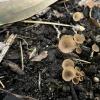
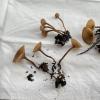
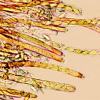
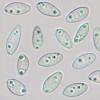
 On-the-sclerotinia-disease-of-camelia-Hara-1919--0001.pdf
On-the-sclerotinia-disease-of-camelia-Hara-1919--0001.pdf